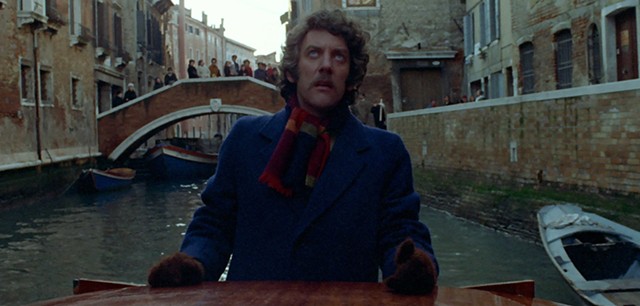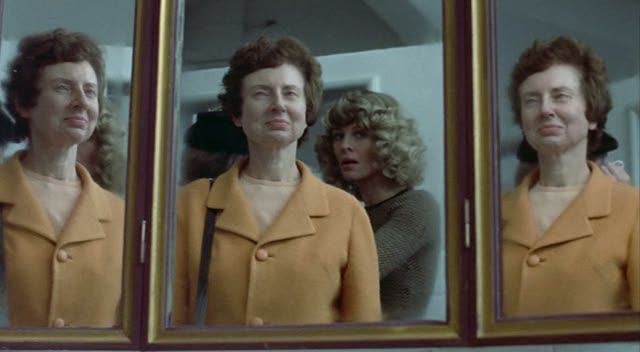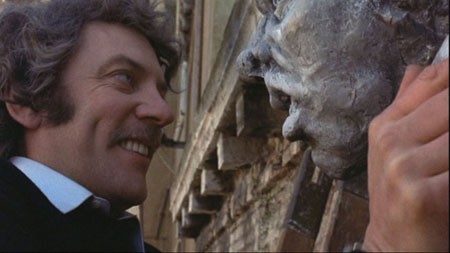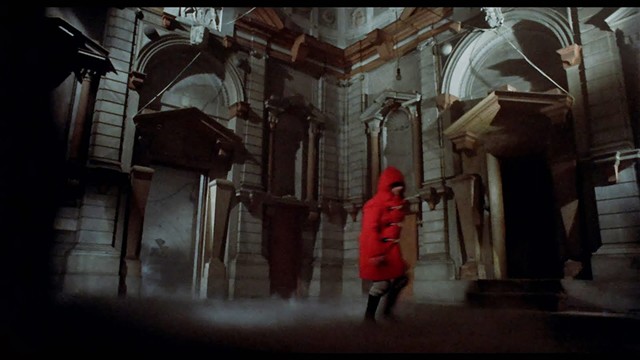
- Paramount Pictures
- The answers aren't up there.
As odd as Don't Look Now is — and if you haven't seen it, I urge you to check it out (it's streaming on Netflix) before continuing, as here there be spoilers — it stars major actors of the time (Donald Sutherland and Julie Christie), and was released on a wide scale by a major studio, Paramount Pictures. It still sometimes astonishes me that 1970s cinema audiences could see such challenging fare as Don't Look Now simply by going to their local theater. It's been said many times, but the 1970s really was a remarkable time for filmmaking.
This time around, I really focused on the ways that the title creates and emphasizes various meanings in the film. As someone who has trouble coming up with headlines for his articles, I'm impressed at titles that perfectly, and complexly, inform the cinematic experience. I would argue that Don't Look Now has such a title.
As an idiom, "don't look now [but]" typically precedes the announcement of something that is either genuinely or ironically surprising. Here are a few headline results that come up by entering the phrase into Google: "Don't Look Now, But Libya Is Falling Apart"; "Don't Look Now, But John Kerry Is Flip-Flopping Again"; "Don't Look Now, But Obamacare's Problems Are Starting Again."
Note that, in every case, the phrase "don't look now" doesn't actually add anything whatsoever to the actual meaning of the headline. It's added only to "colloquialize" and liven up the post-comma phrase, which, presumably, was judged to be too dry. Indeed, in most written or spoken uses of this phrase, it's not a bearer of meaning — it's just verbal/written padding that adds a certain "attitude" to the phrase that follows it.
So Don't Look Now's first victory in titling is that it actually renders the phrase meaningful at all.

- Paramount Pictures
- Don't Look Now complicates vision in many ways, as demonstrated by this multi-mirror shot.
Implicit in the phrase "don't look now" is that a surprise will follow its utterance. Here, the film taps into its conventional meaning. Most of the major events in the film's story are unexpected and unpredictable: the accidental death of John and Laura's daughter, Christine; the series of murders that has Venice on edge; the chance encounter with Wendy and Heather, the latter of whom claims to be able to "see" Christine, as well as the future; the near-fatal accident in the church; John's unexplained visions; the murder that ends the film.
In this context, the film's title may rightly be taken as a kind of warning to the main characters, a "heads up" to be on their guard.
This is one of the ways in which Don't Look Now is a somewhat unusual film: Many of its most important events do not follow logically from previous events. That's not to say the events are random, but they're guided by something other than the conventional narrative logic of most mainstream Hollywood films.
The film's title is also an exhortation (to the main characters, John in particular) not to look — that is, not to depend on their eyes for the answers they're seeking but on their other senses. More accurately, it notifies them that such corporeal sensory apparati as vision are woefully inadequate in the world of Don't Look Now.
John could have avoided the accident in the church if he'd used the clairvoyance he's been suppressing. Similarly, if he'd simply accepted his ability rather than denying it on logical grounds, he could even have prevented the death of Christine. John may not heed the advice not to look, but Laura is more open to it, opting to believe that Heather really can guide her through the spirit world. That her fate is far less grim than John's reflects her choice to abandon conventional looking.
The most important word in the film's title is its last: now. This is especially ironic since, in the standard usage of the phrase "don't look now," the last word is the most meaningless.

- Paramount Pictures
- Another mirror, of a sort
Don't Look Now inverts this, imbuing its final word with special portent. Read in the context of the film's explorations of clairvoyance, the word (and the title as a whole) is an even more specific warning to the characters: Don't look now, but look at a different time. Do your looking, that is, in a time that is not the time in which you currently find yourself — turn your "inner vision" to the future.
This titular advice is specifically directed, once again, toward John, who is unable to accept the existence of clairvoyance, much less his own extrasensory abilities. Had he only been able to read the title of the film in which he appears, he would have avoided a great many tragedies.
Titles are always important, but it's rare when one can access so many different levels of meaning as with Don't Look Now. I'd even argue that a better title for the film could not have been chosen — though, in this case, we'll have to give the credit not to Nicolas Roeg but to Daphne Du Maurier, who wrote the story on which the film is based. I haven't read the story, but I nevertheless nominate "Don't Look Now" as one of the very best of all film titles. If you have any nominations of your own, please chime in!

- Paramount Pictures
- Seeing is most decidedly not believing in this film.
Speaking of...
-

Student Film Documents Failed Plan to Cut Books From Vermont State University Libraries
Apr 29, 2024 -

A New Film Explores Vermont’s Unsung Modernist Buildings
Mar 20, 2024 -

A Film Critic Pays Final Respects to the Palace 9
Nov 11, 2023 -

Director Jay Craven Wins 10th Annual Herb Lockwood Prize
Oct 21, 2023 -

Book Review: 'Save Me a Seat! A Life With Movies,' Rick Winston
Aug 30, 2023 - More »





Comments
Comments are closed.
From 2014-2020, Seven Days allowed readers to comment on all stories posted on our website. While we've appreciated the suggestions and insights, right now Seven Days is prioritizing our core mission — producing high-quality, responsible local journalism — over moderating online debates between readers.
To criticize, correct or praise our reporting, please send us a letter to the editor or send us a tip. We’ll check it out and report the results.
Online comments may return when we have better tech tools for managing them. Thanks for reading.